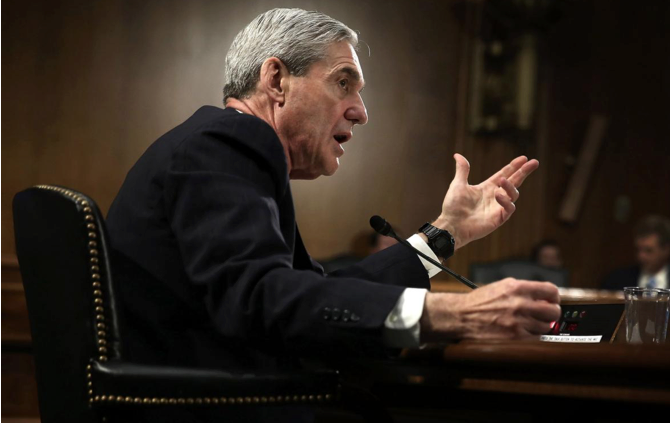CommentsMUELLER WELCOMED .. WITH CAUTION--While many welcome the appointment of former FBI Director Robert Mueller to oversee the Russia probe as a "first step," observers warn that it is not enough to guarantee an independent, impartial investigation nor to tackle the range of possible misdeeds by President Donald Trump and his team.
Mueller's appointment, announced Wednesday by Deputy Attorney General Rod Rosenstein, as special counsel to lead the investigation into possible ties between Russian election meddling and the 2016 Trump campaign was met with bipartisan applause. It comes as popular demand for an independent probe into an increasingly convoluted Russia investigation has reached nearly fever pitch.
Common Cause president Karen Hobert Flynn called it "a positive, necessary first step" and "proof that our democracy is resilient." American Civil Liberties Union (ACLU) executive director Anthony Romero declared it "a critically necessary step given the conflicts of interest present at the Trump administration's highest levels."
(For his part, Trump called "it the single greatest witch hunt of a politician in American history!")
However, those groups—in addition to a number of Democratic lawmakers—say that the appointment must be coupled with an independent commission, similar to the 9/11 commission, "to augment the efforts of the special prosecutor and follow the evidence wherever it leads," as Hobart put it.
But others are warning that the appointment of the special counsel without such a commission may actually hobble truth-seeking.
As the Atlantic's David Frum wrote earlier this week, "such an appointment could well turn into a shield for wrongdoing."
He explained:
Of all the types of independent investigation that have been suggested, a special prosecutor is the most likely to disappear down rabbit holes—the least likely answer the questions that needed to be answered. A select committee of Congress or an independent commission of nonpartisan experts established by Congress can ask the broad question: What happened? A select committee or an independent commission can organize its inquiry according to priority, leaving the secondary and tertiary issues to the historians. A select committee or an independent commission is not barred from looking at events in earlier years statutes of limitations. A select committee or an independent commission seeks truth.
A special prosecutor, by contrast, seeks crimes. The criminal law is a heavy tool, and for that reason it is thickly encased in protections for accused persons. The most important protection from the point of view of the Trump-Russia matter is the rule of silence. A prosecutor investigating a crime can often discover non-criminal bad actions by the people he is investigating. If those bad actions do not amount to crimes, the prosecutor is supposed to look away.
Josh Marshall, published and editor of Talking Points Memo, similarly wrote Wednesday:
It is critical to understand that the most important details we need to know about the Russian disruption campaign and the Trump campaign's possible collusion with it may not be crimes. Indeed, I would say that the crimes we're likely to discover will likely be incidental or secondary to the broader actions and activities we're trying to uncover. Just hypothetically, what if Russia had a disruption campaign, Trump campaign officials gave winks and nods to nudge it forward but violated no laws? That’s hard to figure but by no means impossible. (Our criminal laws are not really designed for this set of facts.) The simple point is that the most important 'bad acts' may well not be crimes. That means not only is no one punished but far, far more important, we would never know what happened.
Digging into the details of the Department of Justice press statement, investigative journalist Marcy Wheeler cautioned that the scope of Mueller's investigation "is totally inadequate."
Following Wednesday's order, Wheeler wrote at her blog:
As I read this, it covers just the investigation into ties between the Russian government and people associated with Trump's campaign. Presumably, that includes Mike Flynn, Paul Manafort, and Carter Page, among others.
But there are other aspects of the great swamp that is the Trump and Russia orbit that might not be included here. For example, would Manafort's corrupt deals with Ukrainian oligarchs be included? Would Flynn's discussions with Turkish officials, or Rudy Giuliani's attempt to excuse Turkey's violation of Iran sanctions? Would the garden variety money laundering on behalf of non-governmental Russian mobbed up businessmen be included, something that might affect Manafort, Jared Kushner, or Trump himself?
[...] Any one of those investigations might present strings that can be pulled, any one of which might lead to the unraveling of the central question: did Trump's associates coordinate with the Russian government to become President. Unless Mueller can serve to protect those other corners of the investigation from Trump's tampering, it would be easy to shut down any of them as they become productive.
(Lauren McCauley writes for Common Dreams … where this perspective was first posted.)
-cw
Explore
Our mission is to promote and facilitate civic engagement and neighborhood empowerment, and to hold area government and its politicians accountable.

 CityWatch Los Angeles
Politics. Perspective. Participation.
CityWatch Los Angeles
Politics. Perspective. Participation.
21
Mon, Apr















